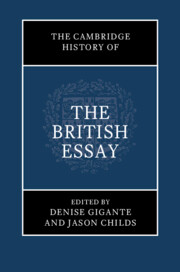Book contents
- The Cambridge History of the British Essay
- The Cambridge History of the British Essay
- Copyright page
- Contents
- Illustrations
- Contributors
- Acknowledgements
- Preface to a History in the Manner of an Essay
- Part I Forming the British Essay
- Part II The Great Age of the British Essay
- Part III Assaying Culture, Education, Reform
- Part IV Fractured Selves, Fragmented Worlds
- Part V The Essay and the Essayistic Today
- 39 The Eye and the I: Essay and Image
- 40 Of Human Suffering: The Essay and Ekphrasis
- 41 After Empire: Postcolonialism and the Essay
- 42 Performance and the Irish Essay
- 43 The Essay and the Public Intellectual
- 44 Essayism in Literary Theory
- 45 The Essay in the Career of the Contemporary British Novelist
- 46 Blogging in Britain: Essays in the Digital Age
- 47 The Essay, Ecocriticism, and the Anthropocene
- Book part
- Bibliography
- Index
40 - Of Human Suffering: The Essay and Ekphrasis
from Part V - The Essay and the Essayistic Today
Published online by Cambridge University Press: 31 October 2024
- The Cambridge History of the British Essay
- The Cambridge History of the British Essay
- Copyright page
- Contents
- Illustrations
- Contributors
- Acknowledgements
- Preface to a History in the Manner of an Essay
- Part I Forming the British Essay
- Part II The Great Age of the British Essay
- Part III Assaying Culture, Education, Reform
- Part IV Fractured Selves, Fragmented Worlds
- Part V The Essay and the Essayistic Today
- 39 The Eye and the I: Essay and Image
- 40 Of Human Suffering: The Essay and Ekphrasis
- 41 After Empire: Postcolonialism and the Essay
- 42 Performance and the Irish Essay
- 43 The Essay and the Public Intellectual
- 44 Essayism in Literary Theory
- 45 The Essay in the Career of the Contemporary British Novelist
- 46 Blogging in Britain: Essays in the Digital Age
- 47 The Essay, Ecocriticism, and the Anthropocene
- Book part
- Bibliography
- Index
Summary
This chapter considers the ekphrastic essay in British history, from nineteenth-century art writing to twentieth and early twenty-first-century writing about photography and experimental essay films. If ekphrasis is the attempt to render visual representations in verbal form, the ekphrastic essay can also register the limits of that representation in our inability fully to depict or describe such experiences as strife, pain, and human suffering. Ekphrastic essays, this chapter suggests, take the problem of bearing witness as part of their formal logic, using the doubt and critical force of the essay form to trace the image of suffering. From Walter Pater’s meditations on the quiet despair of Botticelli’s Madonnas, to John Akomfrah’s three-screen examinations of climate change and colonial violence and John Smith’s small-scale films that challenge representations of the ‘War on Terror’, ekphrastic essays compel us to notice what we cannot so easily see.
Keywords
- Type
- Chapter
- Information
- The Cambridge History of the British Essay , pp. 601 - 618Publisher: Cambridge University PressPrint publication year: 2024

